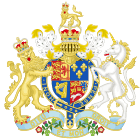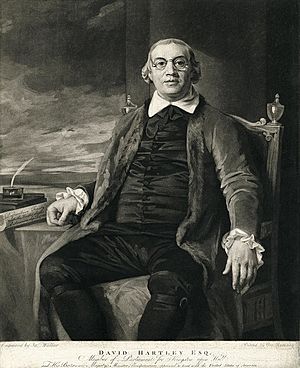David Hartley (the Younger) facts for kids
David Hartley the Younger (born in 1732, died in 1813) was an important English politician and a clever inventor. He was the son of a famous thinker named David Hartley. David Hartley the Younger served as a Member of Parliament (MP) for Kingston upon Hull. He was also chosen by King George III to represent Great Britain in talks with the United States of America after the American Revolution. He signed the 1783 Treaty of Paris, which officially ended the American Revolutionary War. Hartley was also the first MP to speak out against the slave trade in the House of Commons in 1776, saying it was "contrary to the laws of God and the rights of men."
Life of David Hartley
Hartley was born in Bath, England, in 1732. He started studying at Corpus Christi College, Oxford when he was 15. He later became a fellow at Merton College, Oxford, where he stayed until he died.
In the 1760s, Hartley became known as a scientist. He became close friends with Benjamin Franklin, a famous American inventor and statesman, because they shared many interests. Hartley supported the Lord Rockingham's Whigs, a political group.
He was a Member of Parliament for Kingston upon Hull from 1774 to 1780, and again from 1782 to 1784. He became well-known for being against the war with America and against the African slave trade. Another person who fought to end slavery, William Wilberforce, later became an MP for Hull and served alongside Hartley for a time.
Hartley was very good at understanding public money matters. He often spoke in Parliament against the war in America. Because of his friendship with Benjamin Franklin and his support for Lord Rockingham, he was chosen by the government to represent Great Britain in Paris. There, on September 3, 1783, he and Franklin signed the final peace treaty between Great Britain and the United States.
David Hartley died in Bath on December 19, 1813, when he was 81 years old.
David Hartley's Writings
Most of Hartley's writings were about politics. They showed the ideas of the very liberal thinkers of his time. In 1764, he wrote a strong criticism of the government led by Lord Bute.
His most important writings are his Letters on the American War. These were published in London in 1778 and 1779 and were written to the people he represented in Parliament. In these letters, he explained that there was a way for Great Britain and America to become friends again. He believed the government's goal was to gain more power for the king through taxes from America, without Parliament's control. He always tried to show why people were right to oppose the war. In 1794, he also wrote about the French Revolution, showing his support for it.
Hartley also helped publish his father's famous book, Observations on Man, in 1791 and again in 1801.
Hartley's Inventions
In his later years, Hartley studied chemistry and mechanics. In 1774, he published a book called Account of a Method of Securing Buildings and Ships against Fire. In this book, he described his invention: placing thin iron plates under floors and attaching them to ceilings. This was meant to stop fires from spreading quickly and to cut off the air supply that feeds a fire.
To prove his invention worked, he built a special house called Wildcroft Manor on Putney Heath. An obelisk, which is a tall, narrow monument, was built on the heath in 1776. It marked the decision by the Lord Mayor of London to give Hartley £2,500 for his work on fire plates. The obelisk also mentions that it was built on the 110th anniversary of the Great Fire of London. When Richmond House caught fire in 1791, Hartley wrote a pamphlet to remind people how useful his fire plates could be.
The brick obelisk still stands on Putney Heath today. It is a protected historical building since 1955. The inscriptions on the obelisk explain that it was built to remember Hartley's invention for making buildings safer from fire. They also mention that the City of London recognized his work and granted him the "Freedom of the City" for his efforts. The British Parliament also granted him money to help with his experiments.
Quick facts for kids Hartley's Patent (Fire Prevention) Act 1776 |
|
|---|---|
| Act of Parliament | |

|
|
| Citation | 17 Geo. 3. c. 6 |
See also
 | Delilah Pierce |
 | Gordon Parks |
 | Augusta Savage |
 | Charles Ethan Porter |


